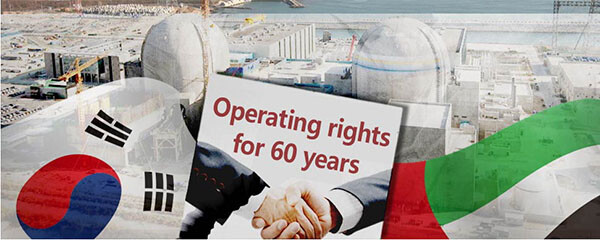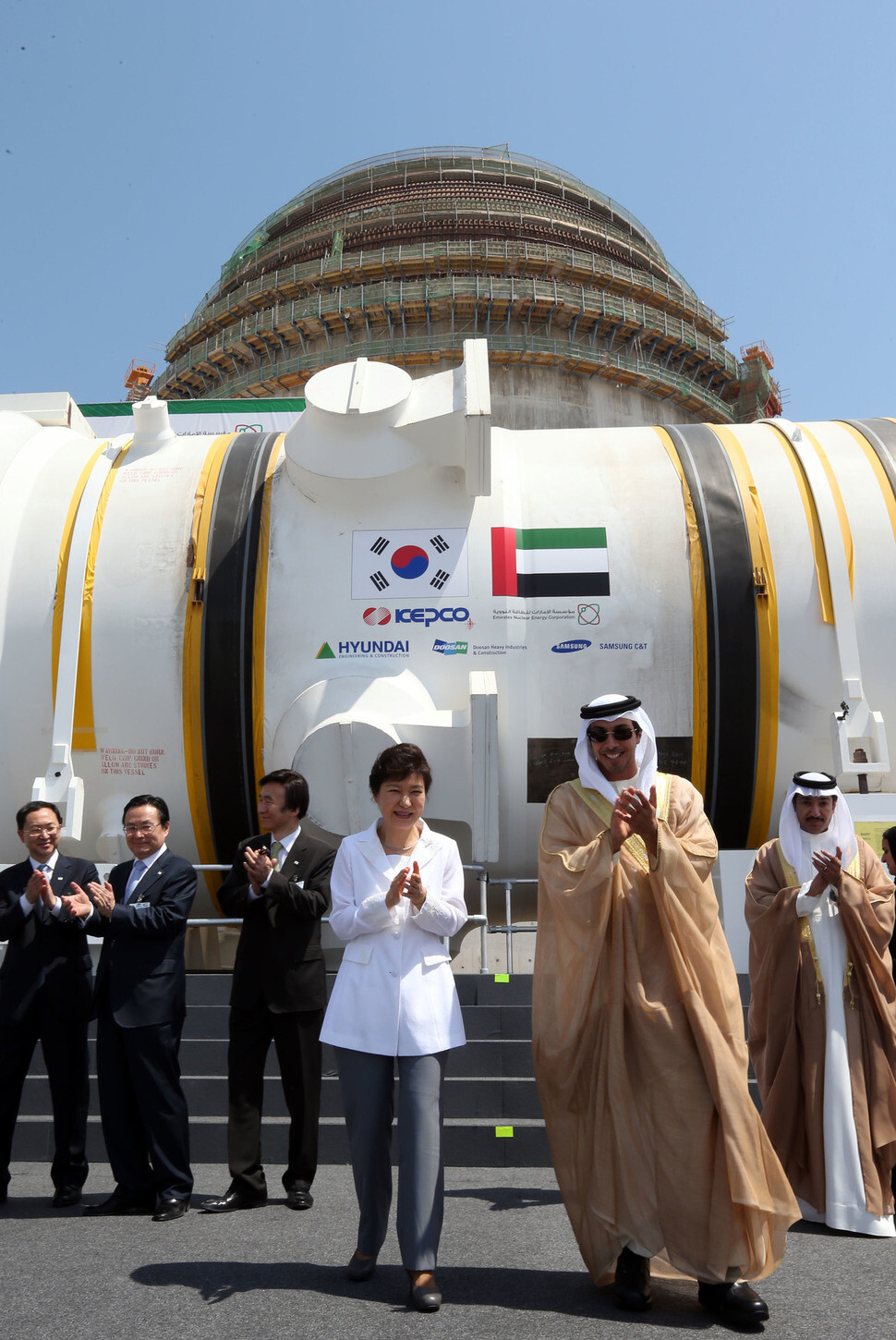hankyoreh
Links to other country sites 다른 나라 사이트 링크
Nuclear reactor contract with UAE is far different from KEPCO’s rosy picture

The Korea Electric Power Corporation’s (KEPCO) contract for operating and investing in four nuclear reactors in the United Arab Emirates (UAE) contains several conditions that are unfavorable to South Korea, one of which stipulates that any legal conflict that may arise must be mediated in the UAE courts, and not the courts of a third country, the Hankyoreh has confirmed. It also turns out that the period during which KEPCO is guaranteed the operating rights of the reactors is just 10 years, and not 60 years as initially reported.
Critics argue that the actual terms of the contract are far different from the rosy picture presented in Oct. 2016 by KEPCO and the administration of former president Park Geun-hye, which claimed that they had secured operating rights for 60 years and that the project would probably yield US$49.4 billion in revenue.
According to a draft document produced by KEPCO called “Equity Investment in the Construction and Operating Project for UAE Nuclear Reactors,” which was released by Kim Byeong-gwan and Hong Ik-pyo, lawmakers with the Democratic Party, on Oct. 19, KEPCO accepted the majority of the UAE’s requests during the negotiations for a nuclear plant operation and investment contract with the Emirates Nuclear Energy Corporation (ENEC), which had been underway since 2009. This is the first time the terms of the contract have been made public.
In short, there are two nuclear energy projects pending in the UAE. One of them is a construction contract worth US$18.6 billion that a KEPCO-led consortium negotiated with ENEC in Dec. 2009. The other is the contract for the nuclear plant investment and operation project, which was signed in Oct. 2016. As part of investing in and operating the nuclear plant, KEPCO and ENEC agreed to establish Barakah One (the project corporation) and Nawah Energy (the operating cooperation) at a ratio of 18 to 82. At the time, Seoul touted the contract as a paradigm for exporting South Korean nuclear power.
But the details tell a different story. The original agreement for any legal disputes that might arise between KEPCO and ENEC to be mediated by a London court in accordance with British law was replaced by a plan to adjudicate such disputes in an Abu Dhabi court under UAE law.
“Surely we ought to secure the right to a fair trial, which is the last line of defense. It would be truly awful if we went to court in Abu Dhabi,” said Cho Jeon-hyeok, a former Saenuri Party lawmaker and a member of KEPCO’s board of directors during a meeting of the board in Sept. 2016.
The rate of profit was also slashed from the initial rate of 16% down to 10.5%, and the operating rights will last for 10 years, not 60. “For now we’re making a 10-year contract for O&M [operations and maintenance],” said the director of KEPCO’s Nuclear Power Foreign Development Office during the meeting of the board of directors. In the end, extending the contract for operating rights will require further negotiations, and any disputes that may arise will have to be arbitrated by the local courts. Furthermore, the amount of revenue and dividends from exporting nuclear power (over 60 years) has fallen from US$69 billion and US$21.6 billion in 2012 to US$49.4 billion and US$13.2 billion last year.

One of the apparent causes for this contract was the Park administration’s haste to get results on exporting nuclear plants. After the negotiations stalled last year, Deputy Prime Minister Yoo Il-ho engineered an agreement to conclude the contract within the year while attending a joint economic meeting between the two countries that was held in Abu Dhabi in May.
“Because of hasty decisions by the Lee Myung-bak administration and the incompetence of the Park Geun-hye administration, the UAE nuclear power project concluded with a shoddy contract that doesn’t even make clear whether we’ll reach our target rate of return,” said Hong Ik-pyo.
“The nuclear power contract, which has been repeatedly revised for the worse, resembles the overseas resource development, which was focused solely on promoting government accomplishments without assessing the risks,” Kim Byeong-gwan said.
KEPCO declined to comment because the terms of the contract are confidential.
By Choi Ha-yan, staff reporter
Please direct questions or comments to [english@hani.co.kr]

Editorial・opinion
![[Column] Park Geun-hye déjà vu in Yoon Suk-yeol [Column] Park Geun-hye déjà vu in Yoon Suk-yeol](https://flexible.img.hani.co.kr/flexible/normal/500/300/imgdb/original/2024/0424/651713945113788.jpg) [Column] Park Geun-hye déjà vu in Yoon Suk-yeol
[Column] Park Geun-hye déjà vu in Yoon Suk-yeol![[Editorial] New weight of N. Korea’s nuclear threats makes dialogue all the more urgent [Editorial] New weight of N. Korea’s nuclear threats makes dialogue all the more urgent](https://flexible.img.hani.co.kr/flexible/normal/500/300/imgdb/original/2024/0424/7317139454662664.jpg) [Editorial] New weight of N. Korea’s nuclear threats makes dialogue all the more urgent
[Editorial] New weight of N. Korea’s nuclear threats makes dialogue all the more urgent- [Guest essay] The real reason Korea’s new right wants to dub Rhee a founding father
- [Column] ‘Choson’: Is it time we start referring to N. Korea in its own terms?
- [Editorial] Japan’s rewriting of history with Korea has gone too far
- [Column] The president’s questionable capacity for dialogue
- [Column] Are chaebol firms just pizza pies for families to divvy up as they please?
- [Column] Has Korea, too, crossed the Rubicon on China?
- [Correspondent’s column] In Japan’s alliance with US, echoes of its past alliances with UK
- [Editorial] Does Yoon think the Korean public is wrong?
Most viewed articles
- 1‘We must say no’: Seoul defense chief on Korean, USFK involvement in hypothetical Taiwan crisis
- 2Will NewJeans end up collateral damage in internal feud at K-pop juggernaut Hybe?
- 3[Column] Park Geun-hye déjà vu in Yoon Suk-yeol
- 4Why Korea shouldn’t welcome Japan’s newly beefed up defense cooperation with US
- 5Thursday to mark start of resignations by senior doctors amid standoff with government
- 6N. Korean hackers breached 10 defense contractors in South for months, police say
- 7[Guest essay] The real reason Korea’s new right wants to dub Rhee a founding father
- 8[Column] ‘Choson’: Is it time we start referring to N. Korea in its own terms?
- 9Kim Jong-un expressed ‘satisfaction’ with nuclear counterstrike drill directed at South
- 10[Editorial] New weight of N. Korea’s nuclear threats makes dialogue all the more urgent